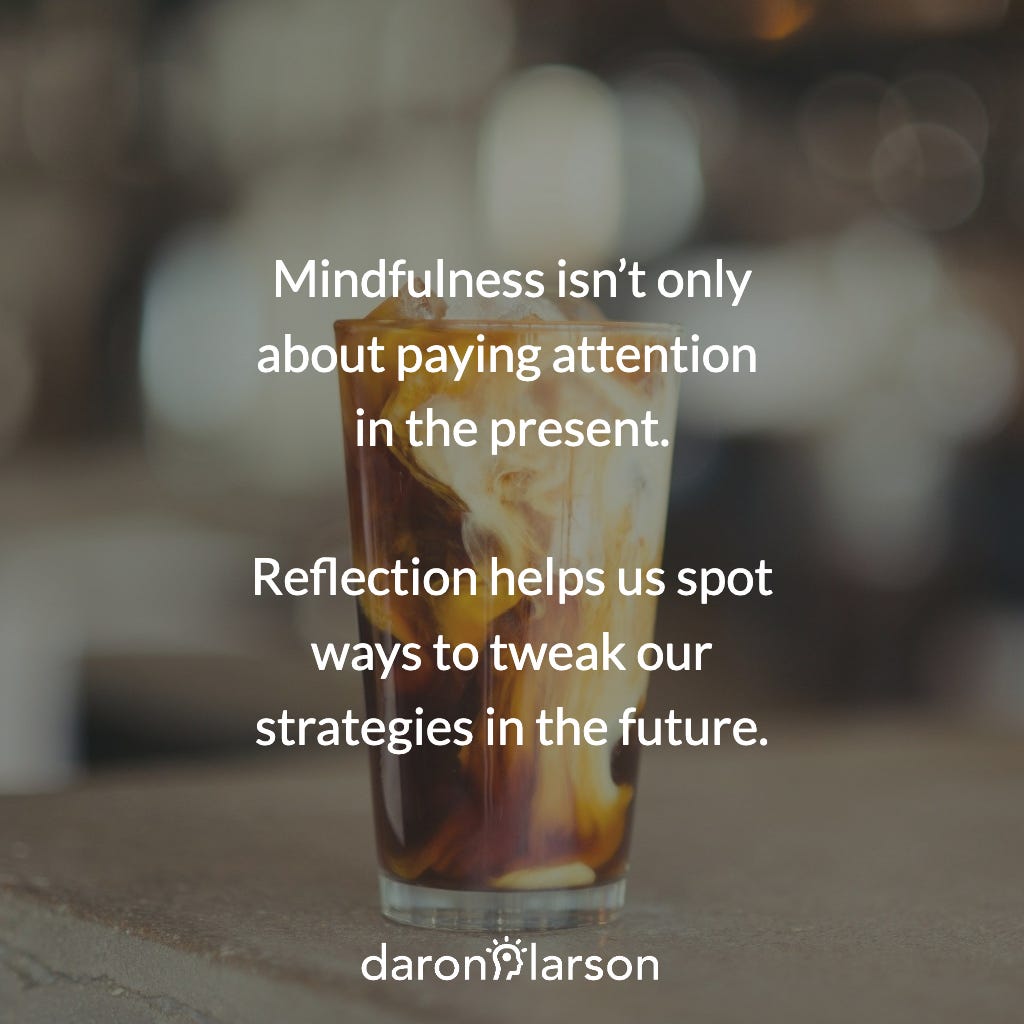We all have habits that we would like to eliminate. These habits are usually ones that we have been cultivating for years. They provide short-term relief and unintentionally become a part of our identities.
I've been coaching a client who has a coffee habit like this. She's not interested in completely giving up coffee. She thoroughly enjoys her morning coffee routine. However, she regrets the high-calorie coffee drinks she has gotten into the habit of having in the afternoons.
She's fairly new to mindfulness. While she has enjoyed the guided exercises she has tried in the past, she finds formal meditation very challenging because her mind never stops. She was, however, willing to try any exercises or strategies that might help her resist her mid-afternoon coffee shop compulsion.
After some discussion and brainstorming, we came up with this experiment together.
Coffee Craving A/B Test
Sneak a pause into your afternoon coffee routine to (1) notice the specific sensations associated with the craving and (2) explore alternative responses.
Over the next ten days, switch between these two responses to your coffee cravings.
A Days — Indulge Mindfully
When you notice an urge for an afternoon coffee, examine the craving closely for two or three minutes.
Ask yourself, ‘What’s behind the craving? Am I tired? Is my energy low? Am I aware of any specific feeling I can name?’ This introspection step disrupts the autopilot reaction and teaches you to observe cravings more closely before deciding how to respond.
Acknowledge that you feel tired or are experiencing emotional discomfort and deserve to feel comfortable, safe, and energized.
When you’re ready, place your coffee order. You can also change your mind and skip this step.
Get curious about the blend of relief and regret you feel after finishing your coffee.
B Days — Select an Alternative
When you feel the urge for an afternoon coffee, examine the craving for two or three minutes — before considering an alternative choice.
Instead of telling yourself, “This is what it feels like to deny myself a treat I deserve even though I often regret it,” try to say to yourself, “This is what it feels like to make a conscious choice about a habitual behavior.”
Get curious about any relief you can generate without coffee and notice if it feels different with less regret.
Start by creating a list of alternative comforting options to try out. Take notes on your attempts to address a problematic habit.
Keep an eye out for subtle, pleasant sensations to practice savoring. This can help counteract the strong allure of immediate gratification from unhealthy or unwanted habits sooner than you might expect.
Remember, being more mindful doesn't always mean feeling relaxed, calm, or at peace. It's about being curious about what it feels like to be alive, regardless of your feelings.
Establishing healthy habits, setting limits, and doing good things for ourselves can be uncomfortable. Embracing the discomfort related to behaviors we don't regret can be energizing and boost our self-respect.
Give it more time than you think it will take. Make it an ongoing practice and celebrate small wins.
Initial results
During the course of this experiment, she noticed four factors that were heightening her desire for coffee:
Feeling overwhelmed
Feeling fatigued
Wanting to celebrate an accomplishment
Wishing to reward herself for working hard
She was pleasantly surprised to discover how much she enjoyed tea with almond milk as an alternative treat. It had significantly fewer calories, was less expensive, and had no regret. She added this option to her phone app to place her orders. This significantly reduced the time spent deliberating about her choice.
Even though she wasn’t strictly following the A Day with B Day schedule, her usual afternoon coffee frequency decreased to one-third of the original amount when she started the experiment.
Being understaffed at work during a stressful time of year, she was surprised by her strategy's effectiveness. She found it really useful to take the decision-making process off autopilot.
Leverage hindsight
Mindfulness isn’t only about paying attention in the present.
Reflection helps us spot ways to tweak our strategies in the future.
Hindsight grows into foresight as we get better at predicting the short and long-term consequences of our habitual actions.
Make mindfulness personal
Do you have a habit or behavior that you frequently regret?
How could you set up an experiment to change your responses to the triggers or cravings associated with that habit?
If you decide to give it a try, I would love to hear about it.




